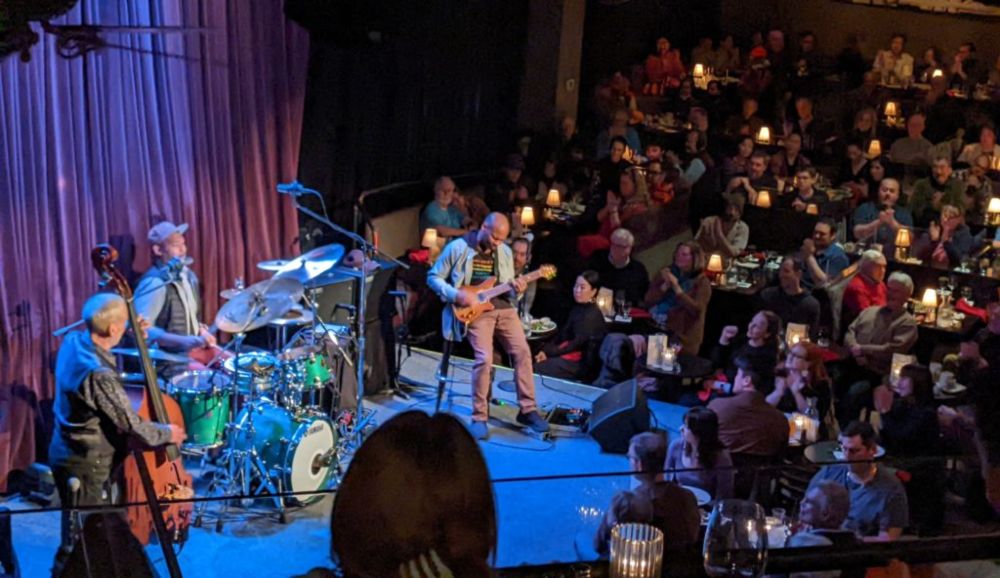It’s perhaps unsurprising that the man behind In a Silent Way and Bitches’ Brew should put on one of the winter’s more inscrutable shows. Among the most discussed albums in jazz, these two all-timers – released by Miles Davis in 1969 and 1970 – are as dense as they are enjoyable. Which is to say, very.
By inscrutable, I don’t mean unattractive. Holland’s trio (Kevin Eubanks on guitar, Eric Harland on drums) reached fabulous epiphanies at Jazz Alley this Wednesday, rocking manically one moment, grooving ruminatively the next. The crowd was delighted. Meanwhile some of us jazz musicians in attendance – I’ve polled a few – were left wondering at song structures, whether the show consisted of chordal changes, vamping, or altogether seat-of-the-pants spontaneity.
This comes back to Holland, and accordingly, to Miles.
Miles Davis “recruited” a 21-year-old Holland in London after seeing him open for the Bill Evans Trio at Ronnie Scott’s. I put that word in quotations because of Davis’s bizarre persona, and the destabilizing forces that imbued his working environment. As Holland laid out in a brilliant 2010 interview, Davis told drummer Philly Joe Jones that he wanted Holland to join his band and promptly left Ronnie Scott’s for his hotel. When Holland called the hotel the next day to get in touch, the concierge said that Miles had already left for America.
Alone with the fledgling rumor, Holland stewed and fretted, and received a call weeks later (from Miles’s agent) asking him to report to a New York City bandstand in three days.
“I just walked away from everything I had in London,” said Holland. Jack DeJohnette picked him up at the airport and brought him to hash out chord changes at Herbie Hancock’s house. Holland reported to the venue the following evening – he still hadn’t exchanged a single word with Miles. Finally the trumpeter ambled unceremoniously onstage and blasted into the set without acknowledging the young Englishman’s existence, despite him apparently being in the band.
I love Miles Davis, but this story qualifies him as the world’s worst boss. Many of us would crack under that kind of pressure – indeed, Hancock said that another bassist had fainted onstage – but Holland steeled himself and jumpstarted what would become one of the most remarkable careers in jazz (for newcomers, I recommend his albums with the Gateway trio).
With an origin story like that, it’s no wonder Holland marches to the beat of his own drum (or rather, plucks to the rhythm of his own bass). For decades he’s experimented with meter and cadence, musical concepts that stood at the forefront of Wednesday’s nearly two-hour set.
“Once we start,” Holland told the audience before his first song, “we don’t like to stop.”
And stop they didn’t. Eubanks’s inimitable finger-style shredding stole the show early on, but the night’s most memorable stints arrived as Holland drifted into bass solos with Eric Harland, the two of them conversing with what seemed preternatural awareness. Abjuring first key, then meter, then anything I could accurately put into words, the rhythm section explored the distant boundaries of improvisational possibility. Thanks to 2021’s Another Land, I suspected the 76-year-old Holland still had it in him. Still, it was sensational to see in person.
As Harland kicked and shuffled his way into the encore’s drum solo, guitarist Eubanks sat cross-legged on stage left, eyes closed, his head nodding along. I watched this body language and wondered if he, like me, might be struggling to discern the tune’s time signature. When he leapt up and tore into a prodigious solo, I couldn’t help but feel a bit left behind.
Discover more from Post Alley
Subscribe to get the latest posts sent to your email.

Eric,
Your post alley reviews add needed coverage to significant local events people need to be aware…happened, even if they couldn’t make it. As someone whose vocation is being an organizer, I can’t help being a little bewildered why you spent energy deriding Miles Davis’ efforts to find and develop what became the core of progressive jazz during the last decades of the 20th century. I would have gone to heaven to have him for a boss-and would have felt already there, if it had transpired.
Respect…..